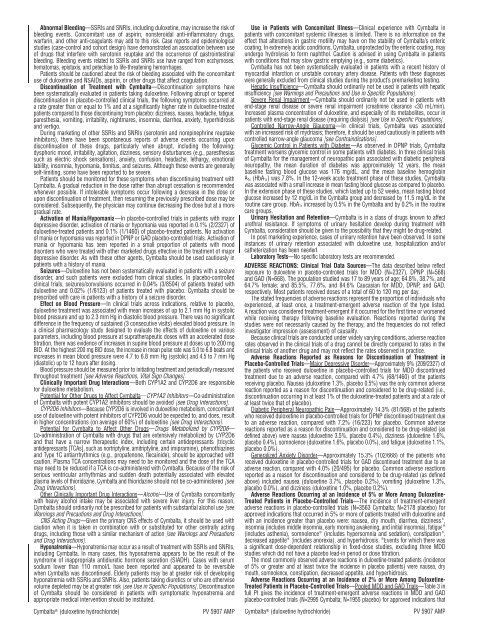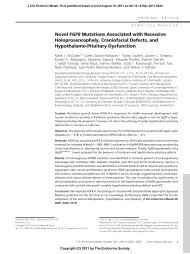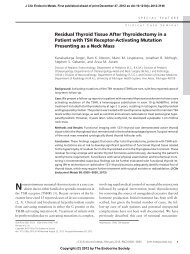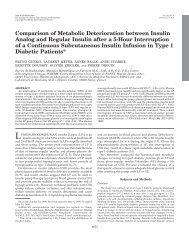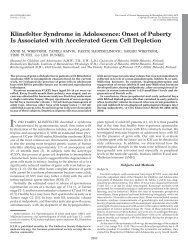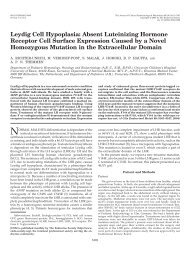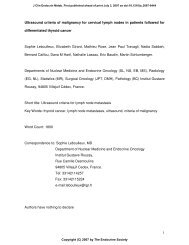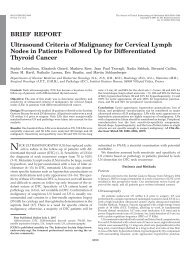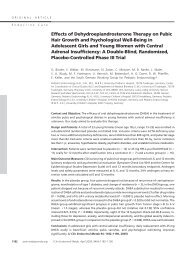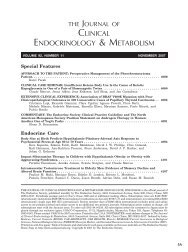Abnormal Bleeding—SSRIs and SNRIs, including duloxetine, may increase the risk <strong>of</strong> Use in Patients with Concomitant Illness—<strong>Clinical</strong> experience with Cymbalta in bleeding events. Concomitant use <strong>of</strong> aspirin, nonsteroidal anti-inflammatory drugs, patients with concomitant systemic illnesses is limited. <strong>The</strong>re is no information on the warfarin, and other anti-coagulants may add to this risk. Case reports and epidemiological effect that alterations in gastric motility may have on the stability <strong>of</strong> Cymbalta’s enteric studies (case-control and cohort design) have demonstrated an association between use coating. In extremely acidic conditions, Cymbalta, unprotected by the enteric coating, may <strong>of</strong> drugs that interfere with serotonin reuptake and the occurrence <strong>of</strong> gastrointestinal undergo hydrolysis to form naphthol. Caution is advised in using Cymbalta in patients bleeding. Bleeding events related to SSRIs and SNRIs use have ranged from ecchymoses, with conditions that may slow gastric emptying (e.g., some diabetics). hematomas, epistaxis, and petechiae to life-threatening hemorrhages. Cymbalta has not been systematically evaluated in patients with a recent history <strong>of</strong> Patients should be cautioned about the risk <strong>of</strong> bleeding associated with the concomitant myocardial infarction or unstable coronary artery disease. Patients with these diagnoses use <strong>of</strong> duloxetine and NSAIDs, aspirin, or other drugs that affect coagulation. were generally excluded from clinical studies during the product’s premarketing testing. Discontinuation <strong>of</strong> Treatment with Cymbalta—Discontinuation symptoms have Hepatic p Insufficiencyy—Cymbalta should ordinarily not be used in patients with hepatic been systematically evaluated in patients taking duloxetine. Following abrupt or tapered insufficiency [see Warnings and Precautions and Use in Specific Populations]. discontinuation in placebo-controlled clinical trials, the following symptoms occurred at Severe Renal Impairment p —Cymbalta should ordinarily not be used in patients with a rate greater than or equal to 1% and at a significantly higher rate in duloxetine-treated end-stage renal disease or severe renal impairment (creatinine clearance
occurred in 2% or more <strong>of</strong> patients treated with duloxetine and with an incidence greater than placebo were: Cardiac Disorders—palpitations; Eye y Disorders—vision blurred; Gastrointestinal Disorders—nausea, dry mouth, diarrhea, constipation∗ , abdominal pain (includes abdominal pain upper, abdominal pain lower, abdominal tenderness, abdominal discomfort, and gastrointestinal pain), vomiting; General Disorders and Administration Site Conditions—fatigue (includes asthenia); Investigations g —weight decreased∗ ; <strong>Metabolism</strong> and Nutrition Disorders—decreased appetite (includes anorexia); Nervous System y Disorders—dizziness, somnolence (includes hypersomnia and sedation), tremor; Psychiatric y Disorders—insomnia (includes middle insomnia, early morning awakening, and initial insomnia), agitation (includes feeling jittery, nervousness, restlessness, tension, and psychomotor agitation), anxiety, decreased libido (includes loss <strong>of</strong> libido), orgasm abnormal (includes anorgasmia), abnormal dreams (includes nightmare); Reproductive p System y and Breast Disorders—erectile dysfunction, ejaculation delayed, ejaculation disorder (includes ejaculation failure and ejaculation dysfunction); Respiratory, p y, Thoracic, , and Mediastinal Disorders—yawning; Skin and Subcutaneous Tissue Disorders—hyperhidrosis; Vascular Disorders—hot flush. ∗ Reactions are categorized by body system according to the following definitions: frequent adverse reactions are those occurring in at least 1/100 patients; infrequent adverse reactions are those occurring in 1/100 to 1/1000 patients; rare reactions are those occurring in fewer than 1/1000 patients. Cardiac Disorders—Frequent: palpitations; Events for which there was a significant dose-dependent relationship in fixed-dose studies, excluding three MDD studies which did not have a placebo lead-in period or dose titration. <strong>The</strong> most commonly observed adverse reactions in duloxetine-treated MDD/GAD patients (incidence <strong>of</strong> 5% or greater and at least twice the incidence in placebo patients) were nausea, dry mouth, constipation, somnolence, decreased appetite, and hyperhidrosis. Diabetic Peripheral p Neuropathic p Pain—Treatment-emergent adverse events that occurred in 2% or more <strong>of</strong> patients treated with Cymbalta in the premarketing acute phase <strong>of</strong> DPN placebo-controlled trials (N=225 Cymbalta 60 mg BID; N=228 Cymbalta 60 mg QD; N=115 Cymbalta 20 mg QD; N=223 placebo) with an incidence greater than placebo were: Gastrointestinal Disorders—nausea, constipation, diarrhea, dry mouth, vomiting, dyspepsia, loose stools; General Disorders and Administration Site Conditions—fatigue, asthenia, pyrexia; Infections and Infestations—nasopharyngitis; <strong>Metabolism</strong> and Nutrition Disorders—decreased appetite, anorexia; Musculoskeletal and Connective Tissue Disorders—muscle cramp, myalgia; Nervous System y Disorders— somnolence, headache, dizziness, tremor; Psychiatric y Disorders—insomnia; Renal and Urinary y Disorders—pollakiuria; Reproductive p System y and Breast Disorders—erectile dysfunction; Respiratory, p y, Thoracic and Mediastinal Disorders—cough, pharyngolaryngeal pain; Skin and Subcutaneous Tissue Disorders—hyperhidrosis. <strong>The</strong> following events were reported by at least 2% <strong>of</strong> patients treated with Cymbalta for DPN and had an incidence ≤ placebo: edema peripheral, influenza, upper respiratory tract infection, back pain, arthralgia, pain in extremity, and pruritus. <strong>The</strong> most commonly observed adverse events in Cymbalta-treated DPN patients (incidence ≥5% and at least twice the incidence in placebo patients) were: nausea; somnolence; dizziness; constipation; dry mouth; hyperhidrosis; decreased appetite; and asthenia. Infrequent: myocardial infarction and tachycardia; Ear and Labyrinth y Disorders—Frequent: vertigo; Infrequent: ear pain and tinnitus; Endocrine Disorders—Infrequent: Hypothyroidism; Eye y Disorders—Frequent: vision blurred; Infrequent: diplopia and visual disturbance; Gastrointestinal Disorders—Frequent: flatulence; Infrequent: eructation, gastritis, halitosis, and stomatitis; Rare: gastric ulcer, hematochezia, and melena; General Disorders and Administration Site Conditions—Frequent: chills/rigors; Infrequent: feeling abnormal, feeling hot and/or cold, malaise, and thirst; Rare: gait disturbance; Infections and Infestations—Infrequent: gastroenteritis and laryngitis; Investigations g —Frequent: weight increased; Infrequent: blood cholesterol increased; <strong>Metabolism</strong> and Nutrition Disorders— Infrequent: dehydration and hyperlipidemia; Rare: dyslipidemia; Musculoskeletal and Connective Tissue Disorders—Frequent: musculoskeletal pain; Infrequent: muscle tightness and muscle twitching; Nervous System y Disorders—Frequent: dysgeusia, lethargy, and parasthesia/hypoesthesia; Infrequent: disturbance in attention, dyskinesia, myoclonus, and poor quality sleep; Rare: dysarthria; Psychiatric y Disorders—Frequent: abnormal dreams and sleep disorder; Infrequent: apathy, bruxism, disorientation/confusional state, irritability, mood swings, and suicide attempt; Rare: completed suicide; Renal and Urinary Disorders—Infrequent: dysuria, micturition urgency, nocturia, polyuria, and urine odor abnormal; Reproductive p System y and Breast Disorders—Frequent: anorgasmia/orgasm abnormal; Infrequent: menopausal symptoms, and sexual dysfunction; Respiratory, p y, Thoracic and Mediastinal Disorders—Frequent: yawning; Infrequent: throat tightness; Skin and Subcutaneous Tissue Disorders—Infrequent: cold sweat, dermatitis contact, erythema, increased tendency to bruise, night sweats, and photosensitivity reaction; Rare: ecchymosis; Vascular Disorders—Frequent: hot flush; Infrequent: flushing, orthostatic hypotension, and peripheral coldness. Postmarketing Spontaneous Reports—<strong>The</strong> following adverse reactions have been identified during postapproval use <strong>of</strong> Cymbalta. Because these reactions are reported voluntarily from a population <strong>of</strong> uncertain size, it is not always possible to reliably estimate their frequency or establish a causal relationship to drug exposure. Adverse reactions reported since market introduction that were temporally related to duloxetine therapy and not mentioned elsewhere in labeling include: anaphylactic reaction, aggression and anger (particularly early in treatment or after treatment discontinuation), angioneurotic edema, erythema multiforme, extrapyramidal disorder, glaucoma, hallucinations, hyperglycemia, hypersensitivity, hypertensive crisis, muscle spasm, rash, supraventricular arrhythmia, tinnitus (upon treatment discontinuation), trismus, and urticaria. Serious skin reactions including Stevens-Johnson Syndrome that have required drug discontinuation and/or hospitalization have been reported with duloxetine. Effects on Male and Female Sexual Function—Changes in sexual desire, sexual performance and sexual satisfaction <strong>of</strong>ten occur as manifestations <strong>of</strong> psychiatric disorders or diabetes, but they may also be a consequence <strong>of</strong> pharmacologic treatment. Because adverse sexual reactions are presumed to be voluntarily underreported, the Arizona Sexual Experience Scale (ASEX), a validated measure designed to identify sexual side effects, was used prospectively in 4 MDD placebo-controlled trials. In these trials, patients treated with Cymbalta experienced significantly more sexual dysfunction, as measured by the total score on the ASEX, than did patients treated with placebo. Gender analysis showed that this difference occurred only in males. Males treated with Cymbalta experienced more difficulty with ability to reach orgasm (ASEX Item 4) than males treated with placebo. Females did not experience more sexual dysfunction on Cymbalta than on placebo as measured by ASEX total score. Physicians should routinely inquire about possible sexual side effects. See Table 5 in full PI for specific ASEX results. Vital Sign Changes—In clinical trials across indications, relative to placebo, duloxetine treatment was associated with mean increases <strong>of</strong> up to 2.1 mm Hg in systolic blood pressure and up to 2.3 mm Hg in diastolic blood pressure. <strong>The</strong>re was no significant difference in the frequency <strong>of</strong> sustained (3 consecutive visits) elevated blood pressure [see Warnings and Precautions]. Duloxetine treatment, for up to 13-weeks in placebo-controlled trials typically caused a small increase in heart rate compared to placebo <strong>of</strong> up to 3 beats per minute. Weight Changes—In placebo-controlled clinical trials, MDD and GAD patients treated with Cymbalta for up to 10-weeks experienced a mean weight loss <strong>of</strong> approximately 0.5 kg, compared with a mean weight gain <strong>of</strong> approximately 0.2 kg in placebo-treated patients. In DPN placebo-controlled clinical trials, patients treated with Cymbalta for up to 13-weeks experienced a mean weight loss <strong>of</strong> approximately 1.1 kg, compared with a mean weight gain <strong>of</strong> approximately 0.2 kg in placebo-treated patients. Laboratory Changes—Cymbalta treatment in placebo-controlled clinical trials, was associated with small mean increases from baseline to endpoint in ALT, AST, CPK, and alkaline phosphatase; infrequent, modest, transient, abnormal values were observed for these analytes in Cymbalta-treated patients when compared with placebo-treated patients [see Warnings and Precautions]. Electrocardiogram Changes—Electrocardiograms were obtained from duloxetinetreated patients and placebo-treated patients in clinical trials lasting up to 13-weeks. No clinically significant differences were observed for QTc, QT, PR, and QRS intervals between duloxetine-treated and placebo-treated patients. <strong>The</strong>re were no differences in clinically meaningful QTcF elevations between duloxetine and placebo. In a positive-controlled study in healthy volunteers using duloxetine up to 200 mg BID, no prolongation <strong>of</strong> the corrected QT interval was observed. Other Adverse Reactions Observed During the Premarketing and Postmarketing <strong>Clinical</strong> Trial Evaluation <strong>of</strong> Duloxetine—Following is a list <strong>of</strong> treatment-emergent adverse reactions reported by patients treated with duloxetine in clinical trials. In clinical trials <strong>of</strong> all indications, 23,983 patients were treated with duloxetine. Of these, 6,702 took duloxetine for at least 6 months, and 3,006 for at least one year. <strong>The</strong> following listing is not intended to include reactions (1) already listed in previous tables or elsewhere in labeling, (2) for which a drug cause was remote, (3) which were so general as to be uninformative, (4) which were not considered to have significant clinical implications, or (5) which occurred at a rate equal to or less than placebo. DRUG INTERACTIONS: Both CYP1A2 and CYP2D6 are responsible for duloxetine metabolism. Inhibitors <strong>of</strong> CYP1A2—When duloxetine 60 mg was co-administered with fluvoxamine 100 mg, a potent CYP1A2 inhibitor, to male subjects (n=14) duloxetine AUC was increased approximately 6-fold, the Cmax was increased about 2.5-fold, andduloxetine t1/2 was increased approximately 3-fold. Other drugs that inhibit CYP1A2 metabolism include cimetidine and quinolone antimicrobials such as cipr<strong>of</strong>loxacin and enoxacin [see Warnings and Precautions]. Inhibitors <strong>of</strong> CYP2D6—Concomitant use <strong>of</strong> duloxetine (40 mg QD) with paroxetine (20 mg QD) increased the concentration <strong>of</strong> duloxetine AUC by about 60%, and greater degrees <strong>of</strong> inhibition are expected with higher doses <strong>of</strong> paroxetine. Similar effects would be expected with other potent CYP2D6 inhibitors (e.g., fluoxetine, quinidine) [see Warnings and Precautions]. Dual Inhibition <strong>of</strong> CYP1A2 and CYP2D6—Concomitant administration <strong>of</strong> duloxetine 40 mg BID with fluvoxamine 100 mg, a potent CYP1A2 inhibitor, to CYP2D6 poor metabolizer subjects (n=14) resulted in a 6-fold increase in duloxetine AUC and Cmax. Drugs that Interfere with Hemostasis (e.g., NSAIDs, Aspirin, and Warfarin)— Serotonin release by platelets plays an important role in hemostasis. Epidemiological studies <strong>of</strong> the case-control and cohort design that have demonstrated an association between use <strong>of</strong> psychotropic drugs that interfere with serotonin reuptake and the occurrence <strong>of</strong> upper gastrointestinal bleeding. <strong>The</strong>se studies have also shown that concurrent use <strong>of</strong> an NSAID or aspirin may potentiate this risk <strong>of</strong> bleeding. Altered anticoagulant effects, including increased bleeding, have been reported when SSRIs or SNRIs are coadministered with warfarin. Patients receiving warfarin therapy should be carefully monitored when duloxetine is initiated or discontinued [see Warnings and Precautions]. Lorazepam—Under steady-state conditions for duloxetine (60 mg Q 12 hours) and lorazepam (2 mg Q 12 hours), the pharmacokinetics <strong>of</strong> duloxetine were not affected by co-administration. Temazepam—Under steady-state conditions for duloxetine (20 mg qhs) and temazepam (30 mg qhs), the pharmacokinetics <strong>of</strong> duloxetine were not affected by co-administration. Drugs that Affect Gastric Acidity—Cymbalta has an enteric coating that resists dissolution until reaching a segment <strong>of</strong> the gastrointestinal tract where the pH exceeds 5.5. In extremely acidic conditions, Cymbalta, unprotected by the enteric coating, may undergo hydrolysis to form naphthol. Caution is advised in using Cymbalta in patients with conditions that may slow gastric emptying (e.g., some diabetics). Drugs that raise the gastrointestinal pH may lead to an earlier release <strong>of</strong> duloxetine. However, co-administration <strong>of</strong> Cymbalta with aluminum- and magnesium-containing antacids (51 mEq) or Cymbalta with famotidine, had no significant effect on the rate or extent <strong>of</strong> duloxetine absorption after administration <strong>of</strong> a 40-mg oral dose. It is unknown whether the concomitant administration <strong>of</strong> proton pump inhibitors affects duloxetine absorption [see Warnings and Precautions]. Drugs Metabolized by CYP1A2—In vitro drug interaction studies demonstrate that duloxetine does not induce CYP1A2 activity. <strong>The</strong>refore, an increase in the metabolism <strong>of</strong> CYP1A2 substrates (e.g., theophylline, caffeine) resulting from induction is not anticipated, although clinical studies <strong>of</strong> induction have not been performed. Duloxetine is an inhibitor <strong>of</strong> the CYP1A2 is<strong>of</strong>orm in in vitro studies, and in two clinical studies the average (90% confidence interval) increase in theophylline AUC was 7% (1%-15%) and 20% (13%-27%) when co-administered with duloxetine (60 mg BID). Cymbalta� (duloxetine hydrochloride) PV 5907 AMP Cymbalta� (duloxetine hydrochloride) PV 5907 AMP


